| Listing 1 - 10 of 52 | << page >> |
Sort by
|
Book
Abstract | Keywords | Export | Availability | Bookmark
 Loading...
Loading...Choose an application
- Reference Manager
- EndNote
- RefWorks (Direct export to RefWorks)
Influential theories have argued that affective processing is fundamentally different from cognitive processing. Others have suggested that theoretical boundaries between affective and cognitive processing are artificial and inherently problematic. Over recent years, different positions on these issues have fueled many empirical studies investigating the mechanisms underlying cognitive and affective processing. Where and on what basis should we draw the line between cognition and emotion? Are there fundamental distinctions to be made between the way emotion influences cognition and cognition influences emotion? How does the reciprocal interaction between emotion and cognition lead to adaptive behavior? This Research Topic explores the nature of the reciprocal interaction between emotion and cognition from a functional perspective.
Affect (Psychology) --- Emotions. --- Decision Making --- action --- Cognition --- Emotion Expression --- Affect --- feelings --- goal-directed behavior --- Decision Making --- action --- Cognition --- Emotion Expression --- Affect --- feelings --- goal-directed behavior
Book
Abstract | Keywords | Export | Availability | Bookmark
 Loading...
Loading...Choose an application
- Reference Manager
- EndNote
- RefWorks (Direct export to RefWorks)
Influential theories have argued that affective processing is fundamentally different from cognitive processing. Others have suggested that theoretical boundaries between affective and cognitive processing are artificial and inherently problematic. Over recent years, different positions on these issues have fueled many empirical studies investigating the mechanisms underlying cognitive and affective processing. Where and on what basis should we draw the line between cognition and emotion? Are there fundamental distinctions to be made between the way emotion influences cognition and cognition influences emotion? How does the reciprocal interaction between emotion and cognition lead to adaptive behavior? This Research Topic explores the nature of the reciprocal interaction between emotion and cognition from a functional perspective.
Affect (Psychology) --- Emotions. --- Decision Making --- action --- Cognition --- Emotion Expression --- Affect --- feelings --- goal-directed behavior
Book
Abstract | Keywords | Export | Availability | Bookmark
 Loading...
Loading...Choose an application
- Reference Manager
- EndNote
- RefWorks (Direct export to RefWorks)
Influential theories have argued that affective processing is fundamentally different from cognitive processing. Others have suggested that theoretical boundaries between affective and cognitive processing are artificial and inherently problematic. Over recent years, different positions on these issues have fueled many empirical studies investigating the mechanisms underlying cognitive and affective processing. Where and on what basis should we draw the line between cognition and emotion? Are there fundamental distinctions to be made between the way emotion influences cognition and cognition influences emotion? How does the reciprocal interaction between emotion and cognition lead to adaptive behavior? This Research Topic explores the nature of the reciprocal interaction between emotion and cognition from a functional perspective.
Affect (Psychology) --- Emotions. --- Decision Making --- action --- Cognition --- Emotion Expression --- Affect --- feelings --- goal-directed behavior
Book
ISBN: 0511002688 0511583389 9780511002687 9780521646369 0521646367 0521550793 9780521550796 0521646367 9780511583384 Year: 1996 Publisher: Cambridge Cambridge University Press
Abstract | Keywords | Export | Availability | Bookmark
 Loading...
Loading...Choose an application
- Reference Manager
- EndNote
- RefWorks (Direct export to RefWorks)
The Myth of Social Action, first published in 1996, is a powerful critique of the sociology of the time and a call to reject the prevailing orthodoxy. Arguing that sociological theory had lost its way, Colin Campbell mounts a case for a new 'dynamic interpretivism' a perspective on human conduct which is more inkeeping with the spirit of traditional Weberian action theory. Discussing and dismissing one by one the main arguments of those who reject individualistic action theory, he demonstrates that this has been wrongly rejected in favour of the interactional, social situationalist approach now dominating sociological thought.
Action theory. --- Sociology --- Goal-directed action --- Goal-directed behavior --- Theory, Action --- Psychology --- Philosophy. --- Philosophy --- Social Sciences --- Action theory --- Sociology - Philosophy
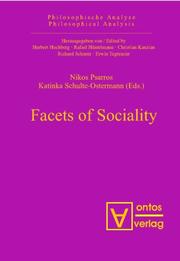

ISBN: 3110326930 9783110326932 3110326590 9783110326598 9783938793398 3938793392 9783110326598 Year: 2013 Volume: Bd. 15 Publisher: Berlin Boston
Abstract | Keywords | Export | Availability | Bookmark
 Loading...
Loading...Choose an application
- Reference Manager
- EndNote
- RefWorks (Direct export to RefWorks)
The aim of this volume is to explore new approaches to the problem of the constitution of the various aspects of sociality and to confront these with received ideas. Therefore many of the contributions to this volume are devoted to a rather holistic and antireductionist conception of social objects, groups, joint actions and collective knowledge. The topics, that are dealt with are: a) the question of the ontological status of social objects and their relation to physical objects, b) collective agency and c) the question whether there can be shared knowledge and shared beliefs - a rather new t
Action theory --- Social interaction --- Social epistemology --- Epistemology, Social --- Knowledge, Theory of --- Social role --- Knowledge, Sociology of --- Goal-directed action --- Goal-directed behavior --- Theory, Action --- Psychology --- Sociology --- Philosophy
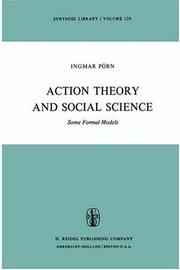
ISBN: 9027708460 9401012709 9401012687 9789027708465 Year: 1977 Volume: 120 Publisher: Dordrecht Reidel
Abstract | Keywords | Export | Availability | Bookmark
 Loading...
Loading...Choose an application
- Reference Manager
- EndNote
- RefWorks (Direct export to RefWorks)
Social sciences --- Methodology. --- Logic --- Philosophy of science --- Action theory --- Goal-directed action --- Goal-directed behavior --- Theory, Action --- Psychology --- Sociology --- Methodology --- Philosophy --- Act (Philosophy) --- Cybernetics --- Action theory. --- Social sciences - Methodology
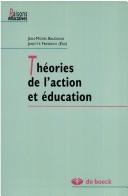
ISBN: 2804136884 9782804136888 Year: 2001 Publisher: Bruxelles De Boeck Université
Abstract | Keywords | Export | Availability | Bookmark
 Loading...
Loading...Choose an application
- Reference Manager
- EndNote
- RefWorks (Direct export to RefWorks)
Action research --- Education --- Action theory --- Research --- #PBIB:2001.4 --- Educational research --- Goal-directed action --- Goal-directed behavior --- Theory, Action --- Psychology --- Sociology --- Social action --- Social sciences --- Philosophy --- Education - Research --- Théorie de l'action --- Éducation --- Recherche --- Action theory. --- Research.
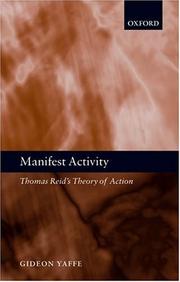
ISBN: 019926855X 0199228035 0191601411 9786611190859 0191533319 1281190853 1435621891 9780191533310 9780199228034 Year: 2004 Publisher: Oxford Clarendon
Abstract | Keywords | Export | Availability | Bookmark
 Loading...
Loading...Choose an application
- Reference Manager
- EndNote
- RefWorks (Direct export to RefWorks)
'Manifest Activity' presents and critically examines Thomas Reid's doctrines about the model of human power, the will, our capacities for purposeful conduct and the place of our agency in the world.
Action theory --- Goal-directed action --- Goal-directed behavior --- Handelingstheorie --- Theory [Action ] --- Théorie de l'action --- Reid, Thomas --- Theory, Action --- Psychology --- Sociology --- Philosophy --- Reid, Thomas, --- Jui-te, Tʻo-ma-ssu, --- Action theory.
Book
ISBN: 0262514761 026228913X 9780262290340 0262290340 9780262289139 9780262014564 0262014564 9780262514767 Year: 2010 Publisher: Cambridge (Mass.) MIT press
Abstract | Keywords | Export | Availability | Bookmark
 Loading...
Loading...Choose an application
- Reference Manager
- EndNote
- RefWorks (Direct export to RefWorks)
The causal theory of action (CTA) is widely recognized in the literature of the philosophy of action as the "standard story" of human action and agency—the nearest approximation in the field to a theoretical orthodoxy. This volume brings together leading figures working in action theory today to discuss issues relating to the CTA and its applications, which range from experimental philosophy to moral psychology. Some of the contributors defend the theory while others criticize it; some draw from historical sources while others focus on recent developments; some rely on the tools of analytic philosophy while others cite the latest empirical research on human action. All agree, however, on the centrality of the CTA in the philosophy of action. The contributors first consider metaphysical issues, then reasons-explanations of action, and, finally, new directions for thinking about the CTA. They discuss such topics as the tenability of some alternatives to the CTA; basic causal deviance; the etiology of action; teleologism and anticausalism; and the compatibility of the CTA with theories of embodied cognition. Two contributors engage in an exchange of views on intentional omissions that stretches over four essays, directly responding to each other in their follow-up essays. As the action-oriented perspective becomes more influential in philosophy of mind and philosophy of cognitive science, this volume offers a long-needed debate over foundational issues.
Act (Philosophy) --- Action theory. --- Intentionality (Philosophy) --- Multi-User. --- PHILOSOPHY/General --- Action theory --- Mind and body --- Philosophy --- Action (Philosophy) --- Agent (Philosophy) --- Goal-directed action --- Goal-directed behavior --- Theory, Action --- Psychology --- Sociology
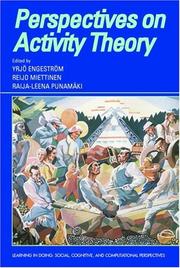
ISBN: 052143730X 0521431271 1316045544 0511812779 9780511812774 9780521431279 9780521437301 Year: 1999 Publisher: Cambridge : Cambridge University Press,
Abstract | Keywords | Export | Availability | Bookmark
 Loading...
Loading...Choose an application
- Reference Manager
- EndNote
- RefWorks (Direct export to RefWorks)
Activity theory is an interdisciplinary approach to human sciences that originates in the cultural-historical psychology school, initiated by Vygotsky, Leont'ev, and Luria. It takes the object-oriented, artifact-mediated collective activity system as its unit of analysis, thus bridging the gulf between the individual subject and the societal structure. This 1999 volume includes 26 chapters on activity theory by authors from ten countries. In Part I of the book, central theoretical issues are discussed from different points of view. Some topics addressed in this part are epistemology, methodology, and the relationship between biological and cultural factors. Part II is devoted to the acquisition and development of language. This part includes a chapter that analyzes writing activity in Japanese classrooms, and a case study of literacy skills of a man with cerebral palsy. Part III contains chapters on play, learning, and education, and Part IV addresses the meaning of technology and the development of work activities. The final part covers issues of therapy and addiction.
Action theory --- Intentionalism --- Act psychology --- Action psychology --- Psychology --- Goal-directed action --- Goal-directed behavior --- Theory, Action --- Sociology --- Congresses --- Philosophy --- Philosophy and psychology of culture --- Educational psychology --- Psycholinguistics --- Historische en vergelijkende pedagogiek. --- Congresses. --- Health Sciences --- Psychiatry & Psychology
| Listing 1 - 10 of 52 | << page >> |
Sort by
|

 Search
Search Feedback
Feedback About UniCat
About UniCat  Help
Help News
News